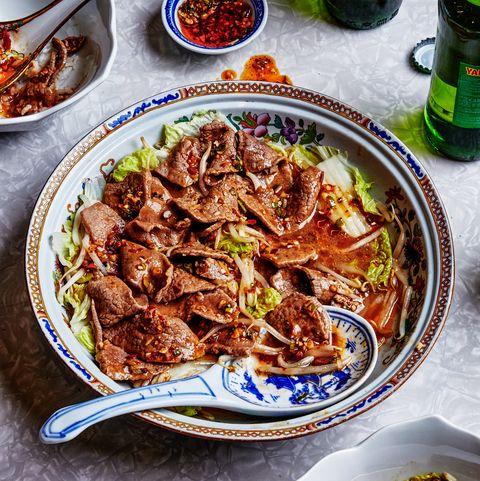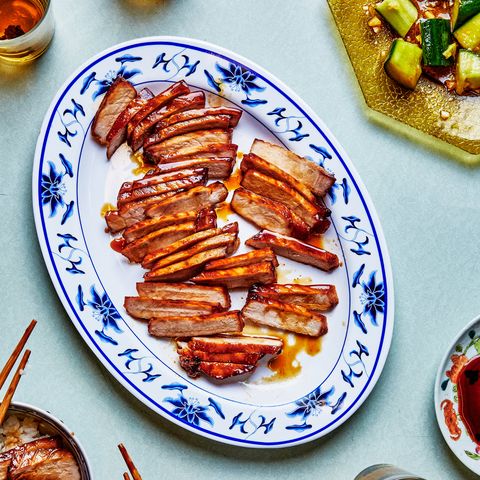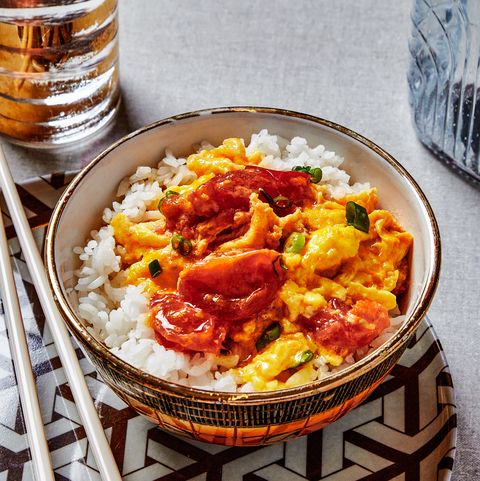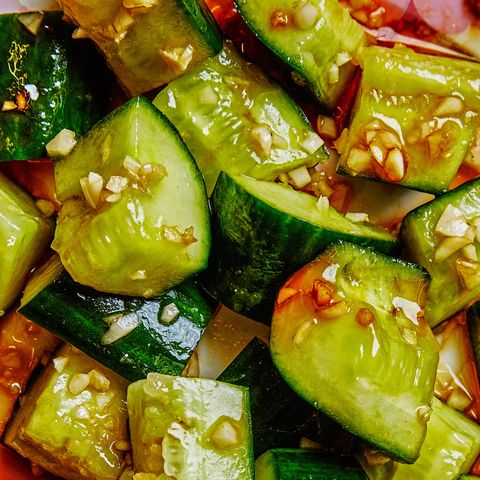CHINESE FOOD IN AMERICA has a long history of being associated with cheap and hearty takeout. Platters of chop suey dressed and sugar-glazed chicken are the classic heavyweights of Chinese American cuisine, often served with a side of deep-fried wontons or a fortune cookie.
For decades, this food—tasty and wonderful in its own right, if not the most healthful—was the only Chinese food Americans knew about, thanks largely to generations of immigrants from one small part of the vast country.
“For over a century, from the time of the gold rush through the 1960s, the Chinese population in America was mainly Cantonese, as was Chinese food in America,” says David R. Chan, a food historian who has eaten at more than 7,500 Chinese restaurants in America.
In the 19th century, droves of immigrants from the southeast region of China adapted their dishes for the American palate using a limited repertoire of ingredients—the high-carb, low-cost food that became associated with the cuisine as a whole.
It stuck around largely because—guess what—Americans have an affinity for high-carb, low-cost food (pizza, fries, the hot dog). It wasn’t until the 1970s and ’80s, after the U. S. reestablished diplomatic relations with mainland China, that other Chinese peoples started immigrating to America and new provincial dishes began to appear.
And, in many cases, it wasn’t until the American-born children of these immigrants grew up to open their own restaurants that this new cuisine—one that’s melding authentic recipes with surprising new flavors and a greater variety of nutritious ingredients—was born.
Consider Johnny Lee in Los Angeles, who specializes in Hong Kong–style barbecue informed by southern-U. S. barbecue culture. Over in Massachusetts, Nadia Liu Spellman serves an updated version of her Fujianese mom’s spicy cucumber salad— crispy chunks of English cucumber marinated in umami-tinged vinegar and tongue-tingling chiles.
We took four amazing recipes from some of the top modern Chinese restaurants in America and had them simplified for the home cook. Each one will completely alter how you think about Chinese food. And, put together, they make a spectacular four-course meal.
Sliced Beef in Hot and Spicy Oil
The lip-tingling, slow-build burn of this entrée has made it a best seller at Duck House Chinese Restaurant in Portland, Oregon, where it’s most often eaten over rice. Duck House co-owner Harvey Liu recommends washing it all down with either a harder cider or an IPA.
What You’ll Need:
2 Tbsp Shaoxing Cooking Wine
1 Tbsp soy sauce
1/2 lb thinly sliced beef brisket
2 Tbsp cornstarch
1 cup bean sprouts
2 large leaves from a napa cabbage, cut into 2-inch pieces
2 Tbsp vegetable oil
1 Tbsp minced ginger
2 garlic cloves
1 scallion, cut into 2-inch pieces
4 dried chile peppers
1 Tbsp Sichuan peppercorns, finely ground
4 Tbsp spicy broad-bean paste
1 Tbsp warmed vegetable oil, finely minced scallion, minced garlic, and crushed red-pepper flakes for garnish
How to Make It:
1. In a large bowl, stir together thecooking wine and soy sauce. Add the brisket and marinate for 15 minutes. Add 2 Tbsp water and stir in the cornstarch. Set aside.
2. In a large pot of boiling water, cook the bean sprouts and cabbage till slightly wilted, 2 to 3 minutes. Strain and rinse under cold water. Place in a serving bowl.
3. In a wok over medium heat, heat the vegetable oil. Add the ginger, garlic, scallion, chile peppers, and Sichuan peppercorns until aromatic, about 1 minute. Add the spicy bean paste and 2 cups water. Bring to a boil, then reduce heat to low and cover for 10 minutes.
4. Strain out the solid ingredients and add the beef, simmering until just cooked through, about 1 minute. Transfer the beef to the serving bowl with bean sprouts and cabbage. Ladle in some broth. Garnish and serve. Feeds 2
Smoky and Sweet Char Siu Pork
This protein-rich meal comes from chef Johnny Lee of Pearl River Deli in Los Angeles. It’s inspired by the fast-casual Chinese-barbecue shops of Hong Kong, where glistening cuts of roast pork and poultry hang in window displays. “My memories are eating this out of Styrofoam boxes over rice,” Lee says. “This recipe works with most cuts of pork, including pork loin, tenderloin—even ribs.”
What You’ll Need:
1 1/4 cup sugar
1/4 cup hoisin sauce, plus 1 Tbsp
2 1/2 Tbsp chu hou paste (or add 2 1/2 Tbsp more hoisin sauce)
1/3 cup dark soy sauce, plus 1 Tbsp
1/4 cup Shaoxing wine
1/4 Tbsp Chinese five-spice powder
2 1/2 lb pork butt, cut into 1-inch-thick steaks
2/3 honey
How to Make It:
1. In a large bowl, stir together thesugar, 1/4 cup salt, 1/4 cup hoisin, the chu hou paste (or more hoisin), ⅓ cup dark soy sauce, the Shaoxing wine, and the Chinese five-spice powder. Add the pork and marinate overnight, or for at least 3 hours.
2. Preheat your grill to medium high. Place the pork on the grill over indirect heat, close the lid, and roast until a meat thermometer inserted into the thickest part of each steak registers 155°F, about 45 minutes.
3. In a small pot, stir together the remaining hoisin and soy sauce, the honey, and 1 cup water. Bring to a boil over low heat and reduce until the glaze is slightly sticky. Cool to room temperature. Brush this glaze over the pork and serve. Feeds 4
Tomato and Egg Over Rice
“There are limitless variations to this recipe,” says Lucas Sin, the head chef of Junzi Kitchen in New York City. “I grew up in Hong Kong, and my father ambitiously grew tomatoes. I remember those fresh tomatoes being cut up and stir-fried with eggs. It’s one of those perfect tomato dishes, sort of like spaghetti and meatballs.”
What You’ll Need:
2 eggs
3 Tbsp vegetable oil
3 scallions (smash the white parts with the flat side of a knife and slice into 1-inch segments; mince the green parts finely for garnish)
2 medium tomatoes, peeled, cored, and cut into 1/2-inch-wide wedges
Sugar, to taste
Steamed rice, for serving
How to Make It:
1. In a small bowl, beat theeggs well with 1/2 tsp salt, 1 Tbsp vegetable oil, and 1 Tbsp water. In a large pan over medium-high heat, add 1 Tbsp vegetable oil. Moving quickly, add the eggs and cook, pushing and folding constantly with chopsticks until just set, about 10 seconds. Remove from heat and transfer to a plate.
2. Wipe out the pan and return it to medium high. Heat the remaining 1 Tbsp oil. Add the scallion whites and cook, stirring, until aromatic and just beginning to brown, about 15 seconds. Add the tomatoes and cook, stirring constantly until they begin to break down, about 3 minutes. Season with salt and sugar to taste.
3. Add the cooked eggs to the tomato sauce. Stir to combine, about 15 seconds. Remove from heat and garnish with the scallion greens. Eat with warm, steamed rice. Feeds 1
Cucumber Salad
“This dish is built on balance—refined yet simple,” says Nadia Liu Spellman, the owner of Dumpling Daughter in Massachusetts. “The acid, sugar, and salt all play an important role and bring out the best in cucumber.”
What You’ll Need:
1 English cucumber, cut into thumb-sized pieces
1/2 cup sugar
1/2 cup white wine vinegar
2 garlic cloves, minced
1 Tbsp sesame oil
1 Tbsp chile oil
1 Tbsp soy sauce
How to Make It:
1. In a medium bowl, tossthe cucumber with 1/2 Tbsp salt. Allow to sit for 1 hour.
2. In a large bowl, stir the sugar and vinegar until the sugar dissolves. Rinse the cucumber well, add it to the vinegar mixture, and refrigerate for at least 12 hours.
3. Strain the cucumber, discarding the marinade, and toss in a large bowl with the garlic, oils, and soy sauce. Serve chilled. Feeds 4
A version of this article appeared in the September 2021 issue of Men’s Health.
This content is created and maintained by a third party, and imported onto this page to help users provide their email addresses. You may be able to find more information about this and similar content at piano.io









